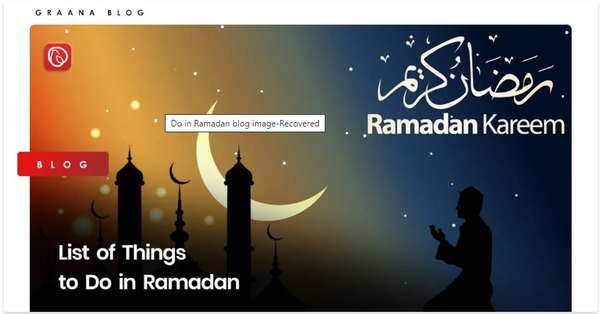Notifications
ALL BUSINESS
COMIDA
DIRECTORIES
ENTERTAINMENT
FINER THINGS
HEALTH
MARKETPLACE
MEMBER's ONLY
MONEY MATTER$
MOTIVATIONAL
NEWS & WEATHER
TECHNOLOGIA
TV NETWORKS
VIDEOS
VOTE USA 2026/2028
INVESTOR RELATIONS
DEV FOR 2025 / 2026
ALL BUSINESS
COMIDA
DIRECTORIES
ENTERTAINMENT
FINER THINGS
HEALTH
MARKETPLACE
MEMBER's ONLY
MONEY MATTER$
MOTIVATIONAL
NEWS & WEATHER
TECHNOLOGIA
TV NETWORKS
VIDEOS
VOTE USA 2026/2028
INVESTOR RELATIONS
DEV FOR 2025 / 2026
 Graana Portal -
March 28, 2023 -
Other -
1K views -
0 Comments -
0 Likes -
0 Reviews
Graana Portal -
March 28, 2023 -
Other -
1K views -
0 Comments -
0 Likes -
0 Reviews

Ramadan is a holy month in the Islamic calendar that is observed by millions of Muslims worldwide. It is a time of spiritual reflection, self-improvement, and increased devotion to God. During this month, Muslims fast from dawn until sunset, abstaining from food, drink, and other physical needs.
However, there is more to Ramadan than just fasting. In this article, we will explore some of the things that Muslims can do during this month to enrich their spiritual lives and connect with their community.
The Significance of Ramadan
Before delving into the things to do in Ramadan, it is important to understand the significance of this month. Ramadan is considered the holiest month in the Islamic calendar because it is the month in which the Quran, the holy book of Islam, was revealed to the Prophet Muhammad.
Fasting during this month is one of the Five Pillars of Islam, which are the fundamental acts of worship that are mandatory for all Muslims. It is a time for Muslims to purify their souls, strengthen their faith, and seek forgiveness for their sins.
List of Things to Do in Ramadan
Attend Tarawih Prayers
Tarawih prayers are special prayers that are offered during Ramadan. These prayers are usually held after the Isha prayer and consist of 20 units of prayer. Attending Tarawih prayers is a great way to connect with your community and engage in collective worship.
Recite the Quran
Ramadan is the month in which the Quran was revealed, so it is a great time to increase your recitation of the Quran. Muslims are encouraged to recite the Quran daily during this month, and some even aim to complete the entire Quran by the end of Ramadan.
Give to Charity
Charity is an important part of Islam, and giving to those in need is especially emphasized during Ramadan. Muslims are encouraged to give generously to charity during this month, and many organizations set up special campaigns to collect donations for those in need.
Break Fast with Others
Breaking the fast, or iftar, with others is a great way to connect with your community and strengthen bonds with friends and family. Many mosques and community centers host iftar dinners, and it is also common for Muslims to invite friends and family over to break fast together.
Perform Nightly Prayers
In addition to Tarawih prayers, Muslims are also encouraged to perform additional prayers at night during Ramadan. These prayers, known as Qiyam-al-Layl, are voluntary but highly recommended and can be a great way to deepen your connection with God.
Seek Forgiveness
Ramadan is a time for spiritual reflection and seeking forgiveness for one's sins. Muslims are encouraged to reflect on their actions and seek forgiveness from God and from those whom they may have wronged.
Increase in Good Deeds
Ramadan is a time for increased devotion to God and doing good deeds. Muslims are encouraged to perform acts of kindness and charity, and to increase their overall good deeds during this month.
Fast with Sincerity and Purpose
Fasting during Ramadan is a mandatory act of worship for Muslims, but it is important to fast with sincerity and purpose. Muslims should aim to fast with the intention of seeking God's pleasure and improving themselves spiritually.
Connect with Family and Friends
Ramadan is a great time to connect with family and friends. Many Muslims make an effort to visit relatives and friends during this month, and it is also common for Muslims to invite friends and family over for iftar dinners.
Attend Islamic Lectures and Events
Many mosques and community centers host special events and lectures during Ramadan. Attending these events can be a great way to deepen your knowledge of Islam and connect with your community.
Practice Patience and Self-Discipline
Fasting during Ramadan requires patience and self-discipline, as Muslims must abstain from food and drink for long periods of time. This can be a great opportunity to practice patience and self-discipline in other areas of your life as well.
Perform Acts of Worship with Family
Performing acts of worship with your family can be a great way to strengthen bonds and deepen your connection with God. You can encourage each other to recite the Quran, attend Tarawih prayers, and perform other acts of worship together.
Make Dua
Dua, or supplication, is a powerful tool in Islam. Muslims are encouraged to make dua during Ramadan, both for themselves and for others. You can make dua for forgiveness, guidance, and blessings for yourself and your loved ones.
Volunteer Your Time
Volunteering your time during Ramadan can be a great way to give back to your community and perform good deeds. You can volunteer at a local charity organization, help prepare iftar meals, or assist with other community events.
Reflect on Your Blessings
Ramadan is a time for spiritual reflection and gratitude. Muslims are encouraged to reflect on their blessings and be grateful for what they have. This can be a great way to cultivate a positive mindset and increase happiness and contentment in your life.
Conclusion
In conclusion, Ramadan is a month of spiritual reflection, self-improvement, and increased devotion to God. There are many things that Muslims can do during this month to enrich their spiritual lives and connect with their community.
From attending Tarawih prayers and reciting the Quran to giving to charity and breaking fast with others, there are countless opportunities for Muslims to deepen their connection with God and perform good deeds. By incorporating these practices into their daily lives, Muslims can make the most of this holy month and emerge spiritually renewed.
Duas for Ramadan
Recitation of Duas is a crucial component of Ramadan, as they are supplications and invocations to Allah. While Duas can be recited at any time, they hold greater significance during Ramadan due to the heightened spiritual atmosphere of the month. Below are some examples of Duas that can be recited during this holy month.Top of Form
Dua for breaking the fast (Iftari)
This Dua is recited at the time of breaking the fast at sunset. The Arabic text of this Dua is
اللَّهُمَّ اِنِّى لَكَ صُمْتُ وَبِكَ امنْتُ [وَعَلَيْكَ تَوَكَّلْتُ] وَعَلَى رِزْقِكَ اَفْطَرْتُ
It translates to “O Allah! I fasted for You and I believe in You and I put my trust in You and I break my fast with Your sustenance.”
Dua for Sehri (pre-dawn meal)
This Dua is recited before the start of the fast, usually at the time of the pre-dawn meal. The Arabic text of this Dua is
“وَبِصَوْمِ غَدٍ نَّوَيْتُ مِنْ شَهْرِ رَمَضَانَ”
It means “I intend to keep the fast tomorrow in the month of Ramadan.”
Duas for Ashras of Ramadan
Ramadan is divided into three parts, each lasting for ten days, known as Ashra. Muslims believe that each Ashra has its unique significance and blessings, and they focus on specific Duas and prayers during each period.
Here are the Duas for each Ashra of Ramadan:
1st Ashra (first ten days of Ramadan)
This Ashra is known as the Ashra of Mercy, and Muslims focus on seeking Allah’s mercy and forgiveness during these days. The following Dua is recommended for recitation during this period:
يَا حَيُّ يَا قَيُّوْمُ بِرَحْمَتِكَ أَسْتَغِيْث
which means “O Living, O Sustaining, in Your Mercy I seek relief.”
2nd Ashra (second ten days of Ramadan)
This Ashra is known as the Ashra of Forgiveness, and Muslims focus on seeking Allah’s forgiveness and repentance during these days. The following Dua is recommended for recitation during this period:
أَسْتَغْفِرُ اللَّهَ الْعَظِيمَ الَّذِي لاَ إِلَهَ إِلاَّ هُوَ الْحَيُّ الْْقَيُّومُ وَ أَتُوبُ إِلَيْهِ
which means “I seek forgiveness from Allah, the Mighty, the Living, the Eternal, and I turn to Him in repentance.”
3rd Ashra (last ten days of Ramadan)
This Ashra is known as the Ashra of Salvation, and Muslims focus on seeking Allah’s protection and deliverance during these days. The following Dua is recommended for recitation during this period:
اَللَّهُمَّ أَجِرْنِي مِنَ النَّارِ
which means “O Allah, Save me from the hellfire (Jahannum).”
FAQs
Can non-Muslims participate in Ramadan activities?
Non-Muslims are welcome to participate in some Ramadan activities, such as iftar dinners and volunteering events. However, some practices, such as fasting, are specific to the Muslim faith and may not be suitable for non-Muslims.
How long does Ramadan last?
Ramadan lasts for one lunar month, which is approximately 29-30 days.
What happens after Ramadan ends?
After Ramadan ends, Muslims celebrate Eid al-Fitr, a three-day festival that marks the end of the month-long fast.
Are there any exceptions to fasting during Ramadan?
There are some exceptions to fasting during Ramadan, such as for pregnant or breastfeeding women, people who are sick or traveling, and children who have not reached puberty.
